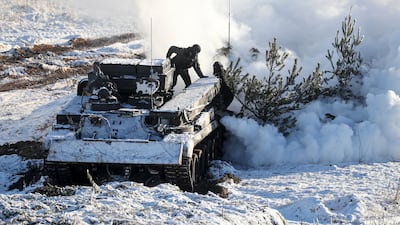A Russian invasion of Ukraine may be imminent despite last-ditch diplomatic efforts to prevent war, British ministers believe.
Cabinet Minister Brandon Lewis said there were now 130,000 Russian troops on the Ukrainian border and that the Kremlin could move very quickly to launch an attack.
It came after Defence Secretary Ben Wallace made a stark comparison between Russia’s military preparations and the eve of the Second World War.
He told The Sunday Times there was a “whiff of Munich” about the West’s diplomacy with Russia, referring to a 1938 agreement that symbolised the failed policy of appeasing Nazi Germany.
Ukraine criticised that remark on Sunday, with ambassador in London Vadym Prystaiko suggesting it was contributing to panic.
But Mr Lewis defended Mr Wallace's comments by saying it was meant as a realistic acceptance that negotiations may fail.
In the 1930s “there was an optimism that there may be a diplomatic way through. That eventually turned out not to be the case,” he told the BBC’s Sunday Morning programme.
The defence secretary was calling on politicians to “understand the reality that while they’re having these diplomatic conversations, Russia has continued to move troops”, said Mr Lewis.
“Therefore we’ve got to be cognisant of the reality they could move very quick.”
The British warnings echo similar assertions by the US government that a Russian attack on Ukraine could come any day.
The leaders of Britain, France and Germany have led a frenzied diplomatic effort to keep Russia at the negotiating table and signal to Moscow that any invasion would be met with severe sanctions.
But Viktor Tatarintsev, Russia’s ambassador to Sweden, brushed off this threat by saying sanctions were not as bad as the West made out.
Using a vulgarity, he told Swedish newspaper Aftonbladet that Russia did not care about sanctions and had learnt to adapt to previous measures.
“We have no Italian or Swiss cheeses, but we've learnt to make just as good Russian cheeses using Italian and Swiss recipes,” he said.
Russia, which denies planning an invasion of Ukraine, is conducting its biggest naval drills in years in the Black Sea and holding separate joint exercises with its ally Belarus.
The fear of war has prompted numerous countries to withdraw diplomatic staff from Ukraine or tell their citizens to leave the country while they can.
Israel’s Prime Minister Naftali Bennett said at the start of a Cabinet meeting on Sunday that citizens in Ukraine should not wait for a situation “where you will really want to come back but it will be impossible”.
Dutch airline KLM announced that it was suspending commercial flights to Ukraine until further notice.
The possible exodus has led to comparisons with the chaotic aftermath of the Taliban’s takeover of power in Afghanistan, with British ministers urged to prepare for a smoother evacuation if necessary.
The government in Kiev has sought to calm the panic. Presidential adviser Mykhailo Podolyak told Reuters on Sunday that there were no plans in Kiev to close the country’s airspace.
“Ukraine itself sees no point in closing the sky. This is nonsense. And, in my opinion, it somewhat resembles a kind of partial blockade,” Mr Podolyak said.
Efforts towards a diplomatic solution will continue next week when German Chancellor Olaf Scholz visits Kiev and Moscow in an attempt to broker peace.
French President Emmanuel Macron resumed his push for peace in a phone call with Mr Putin on Saturday.
Russia has shown no sign of backing down on its demand that Ukraine and other ex-Soviet nations be barred from admission to Nato. Alliance leaders say that is none of the Kremlin’s business.











